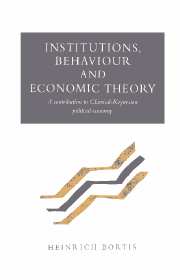Book contents
- Frontmatter
- Contents
- Preface
- Acknowledgements
- Glossary of symbols
- 1 Introduction
- 2 Some basic concepts and issues in the social sciences
- 3 Some basic issues in political economy
- 4 Towards a coherent system of political economy
- 5 Classical-Keynesian political economy and neoclassical economics
- 6 An alternative theory of economic policy
- 7 Political economy in a wider context
- References
- Index
1 - Introduction
Published online by Cambridge University Press: 14 January 2010
- Frontmatter
- Contents
- Preface
- Acknowledgements
- Glossary of symbols
- 1 Introduction
- 2 Some basic concepts and issues in the social sciences
- 3 Some basic issues in political economy
- 4 Towards a coherent system of political economy
- 5 Classical-Keynesian political economy and neoclassical economics
- 6 An alternative theory of economic policy
- 7 Political economy in a wider context
- References
- Index
Summary
Observations on the state of alternative economic theory
In the fifties and sixties the evolution of the Keynesian message resulted in an alternative approach in economic theory which was first labelled neo-Keynesian economics and subsequently post Keynesian economics or political economy. Some of the founders of the new school clearly sought to reconcile the classical (Ricardian) theory of production, value and distribution based upon the surplus principle with the Keynesian theory of employment and output determination through effective demand; others mainly tried to preserve and to elaborate Keynes's heritage which was considered anticlassical because of its rejection of Say's law. In general, the post Keynesians wanted to overcome the neoclassical orthodoxy and consequently considered their approach to be progressive.
The notion ‘post Keynesian’ immediately gives rise to a definitional problem related to the title of the present book which is about ‘classical Keynesian political economy’. At this stage, it is sufficient to note that the latter is a historically based elaboration of the former, in which Quesnay, Ricardo, Marx and Keynes are of particular importance. The term ‘post Keynesian’ is defined in this section. At the end of the next section a working definition of ‘classical-Keynesian’ is provided. This notion is examined more fully in chapter 3 (pp. 76–81).
The return to classical economics starting from Keynesian ground is, indeed, the common theme in much post Keynesian work, for example some of Michal Kalecki's essays written as early as the thirties and forties (Kalecki 1971), Joan Robinson's Accumulation of Capital (Robinson 1965; 1st edn 1956), Nicholas Kaldor's articles on growth and distribution (for example Kaldor 1955/56) and, most importantly, Piero Sraffa's Production of Commodities by Means of Commodities (Sraffa 1960).
- Type
- Chapter
- Information
- Institutions, Behaviour and Economic TheoryA Contribution to Classical-Keynesian Political Economy, pp. 1 - 19Publisher: Cambridge University PressPrint publication year: 1996



